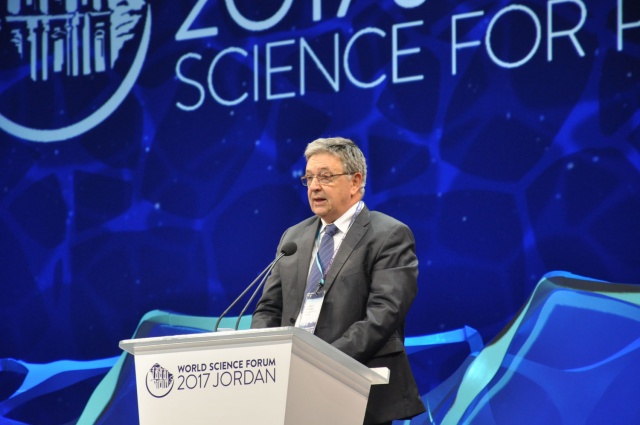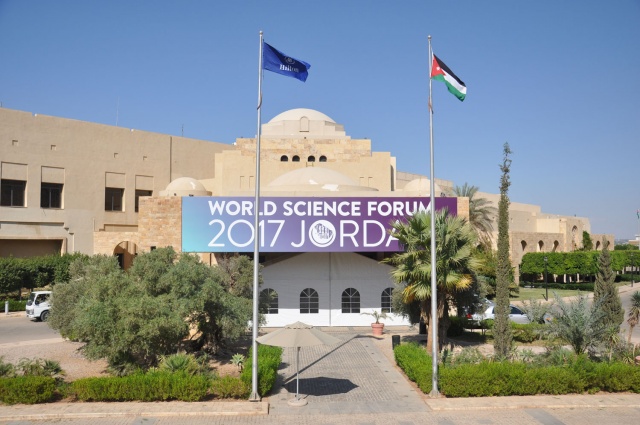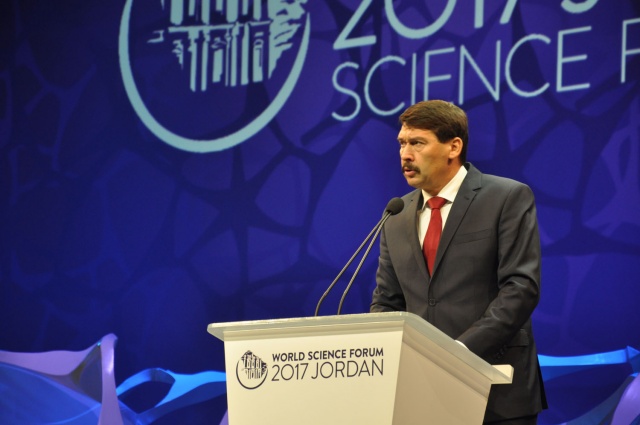Only science can save the planet – World Science Forum opens in Jordan
“It is not enough to analyse and predict alarming trends. To handle global problems, we need new scientific discoveries, and based on them, technological progress and innovation to overcome them,” said Academy President, László Lovász in his inaugural address during the eighth World Science Forum (WSF) in Jordan. The highest level international meeting of researchers, decision makers and scientific policy experts is being held at Earth’s lowest elevation on land, on the shores of the Dead Sea.
8 November, 2017
At the King Hussein Bin Talal Convention Centre the several thousand participants of the 8th World Science Forum are discussing the most effective ways of solving global problems through scientific methods. This year’s motto is “Science for Peace”, which seeks to emphasise the fact that science is indispensable when it comes to solving severe social, economic and environmental conflicts in a peaceful manner worldwide and decision makers have a huge responsibility in achieving this. Current problems include climate change, sustainable use of natural resources (including the preservation of water resources and food safety), relations between migration and sustainable development, the brain-drain, the situation of female researchers, the preparatory role of scientific consultation in decision making and the challenges and chances posed by our digital era.
Perfroming research is not enough
On Tuesday morning, the participants of the forum were greeted by Her Royal Highness Princess Sumaya bint El Hassan, Chair of the World Science Forum 2017 and the President of the Royal Scientific Society of Jordan; László Lovász, President of the Hungarian Academy of Sciences; Gordon McBean, President of the International Council for Science (ICSU); and Rush D. Holt, CEO of the American Association for the Advancement of Science (AAAS).
“The scientific approach, together with its honesty, outspokenness and often political incorrectness, is essential to assess the threats to peace," elaborated László Lovász on the motto of WSF 2017. “We must use scientific methods to analyse major trends in the world and to Please click here to read the 2017 WSF press releasepredict their future development. What is more, it is not enough to analyse and predict alarming trends: we need new scientific discoveries, and based on them, technological progress and innovation to overcome them. Scientific studies must evaluate the risks and benefits of new and old technologies, like GMO’s, nuclear reactors, hydroelectric plants, new procedures in medical treatment and many more,” stated the President. Mr. Lovász went on to say that climate change, overpopulation, poverty, the exhausting of energy resources, deterioration of fertile soils, epidemics and extreme political or religious trends are all processes with complicated and complex consequence chains, which need to be studied in an interdisciplinary fashion by various experts from a number of different scientific fields .
 László Lovász, President of the Hungarian Academy of Sciences delivering his speech on the opening day of the World Science Forum, 2017 mta.hu/Soma Rédey
László Lovász, President of the Hungarian Academy of Sciences delivering his speech on the opening day of the World Science Forum, 2017 mta.hu/Soma RédeyMr. Lovász added, “If we believe in this mission of science, as I feel we all do, then it is not enough to pursue research. We have to make efforts to persuade the public, and here I mean the whole world outside academics: voters, politicians, journalists, teachers, to support us, ask for our opinion, join us and respect scientific facts.”
A record-breaking number of participants
“We are very happy to have the World Science Forum in the Middle East for the first time,” said Princess Sumaya bint El Hassan during her speech. She stressed that the number of participants at the present WSF is unprecedented: from 140 countries approximately 3000 participants have arrived, a thousand of whom came from the Middle East. The program has also been broadened. Besides the nine plenary sessions, there are fourteen thematic sessions and twenty-five special sessions. Several exhibitions were opened for the WSF and Al Gore’s documentary, An Inconvenient Sequel: Truth to Power was also screened, which is a sequel to his previous film, An Inconvenient Truth. The Princess expressed her special thanks to the Hungarian Academy in the founding of the event.
 Conference venue mta.hu/Soma Rédey
Conference venue mta.hu/Soma RédeyIn his welcome speech, Gordon McBean discussed how communication and joint work between different scientific fields and decision makers have improved since the launching of the first WSF conference in 1999. However, he thinks there is still a lot to be done to diminish the number of misunderstandings connected to science. Rush D. Holt stressed that scientists from all countries must unite to ensure that decision making based on scientific evidence spread more rapidly. Additionally, the CEO of AAAS also highlighted the importance of scientific training.
The first plenary session of the 8th World Scientific Forum was dedicated to the message of the 2017 motto. The introductory speech of this plenary session was delivered by His Royal Highness Prince El Hassan bin Talal. One of the distinguished speakers was János Áder, President of Hungary. He spoke about how science can help answer global questions connected to water management, food production and the energy sector.
 János Áder delivering his opening speech mta.hu/Soma Rédey
János Áder delivering his opening speech mta.hu/Soma RédeyHistory of the World Science Forum
The WSF is a biennial event organized by the Hungarian Academy of Sciences and seven other partner institutions since 2003. The symposium was conceived at a scientific/science policy event in Budapest in 1999, the World Conference on Science for the 21st Century: a New Commitment. Since 2011, every second WSF is organized in a partner country. In 2013, Rio de Janeiro hosted the event and this is the second time the conference has been held outside Hungary. At the same time, WSF 2017 is one of the largest scientific events in the Near East. This strengthens Jordan’s role in the peaceful solution of the long lasting political debates in the region and shows the country’s devotion to supporting science.
Interest in the WSF is constantly growing. This year’s agenda offers the richest program ever. László Lovász will speak at the thematic session “A Science-based Advice for Policy-makers in an Era of Alternative Facts”. Katalin Bogyai, Permanent Representative of Hungary to the United Nations will deliver a lecture at the session “Women as Leaders for Diversity and Development”.
The organizing committee announced that the spectacular venue on the shores of the Dead Sea provides ample room for debates and active participation. Furthermore, the noticeably low water level of the salt lake constantly reminds participants of how severe the problems facing scientists and decision makers are.
The World Science Forum is organized by the Hungarian Academy of Sciences and seven international partner institutions: United Nations Educational, Scientific and Cultural Organization (UNESCO), International Council for Science (ICSU), American Association for the Advancement of Science (AAAS), The World Academy of Sciences (TWAS), European Academies Science Advisory Council (EASAC), The InterAcademy Partnership (IAP) representing the academies of science all over the world and International Social Science Council (ISSC). The event is hosted by the Royal Scientific Society of Jordan (RSS). The patrons of the event are His Majesty King Abdullah II Ibn Al Hussein of the Hashimite Kingdom of Jordan, János Áder, the President of Hungary and Irina Bokova, the Director General of UNESCO.
